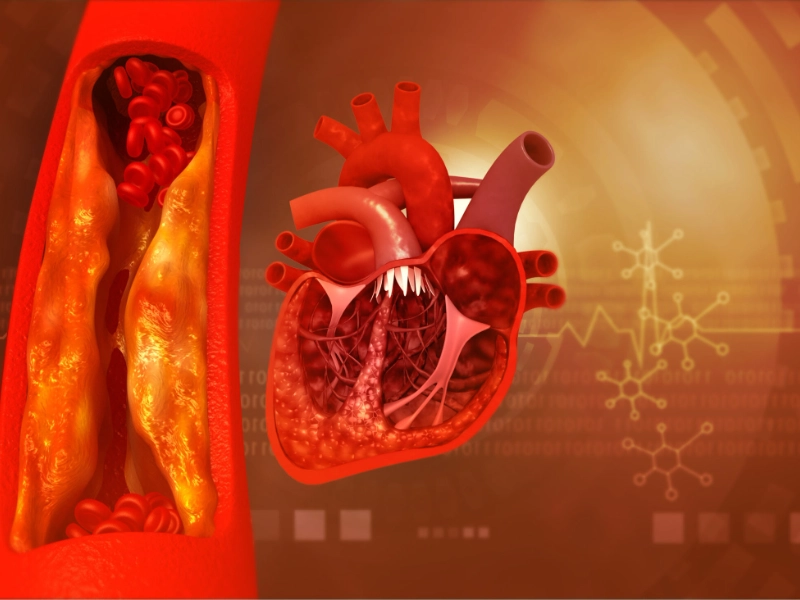The Role of Vitamin K in Maintaining Healthy Arteries
1. Know Vitamin K. Particularly in blood coagulation and bone health, vitamin K is a fat-soluble vitamin that is absolutely vital for many different body systems. Found mostly in green leafy vegetables, K1 (phylloquinone) and K2 (menaquinone) are two main forms of it; animal products and fermented meals contain K2. Although many people know that vitamin K is essential for coagulation, its effects on cardiovascular health—especially in preserving healthy arteries—are also rather important.
2. Value of Good Arteries Appropriate blood circulation and general cardiovascular condition depend on healthy arteries. From the heart to several organs in the body, they move blood high in oxygen from Serious health problems including heart disease, stroke, and high blood pressure can follow from stiff or blocked arteries brought on by plaque development. Reducing the risk of these diseases depends on keeping arterial health, hence vitamin K is rather important in this process.

 5. Vitamin K Deficiency's Effects Deficiency of vitamin K can have major effects on vascular condition. Low levels of vitamin K have been linked to higher risk of cardiovascular illnesses and arterial calcification. Higher vitamin K intake has been linked, in studies, to improved artery health and reduced calcification levels. This emphasises the need of include foods high in vitamin K in the diet to avoid deficit and maintain general cardiovascular condition.
6. Agents of Vitamin K One must eat enough vitamin K from food if one is to keep healthy arteries. Excellent sources of vitamin K1 are green, leafy vegetables including kale, spinach, and broccoli. Foods fermented like natto, sauerkraut, some cheeses supply vitamin K2. Meats, eggs, and dairy items also contain vitamin K2. Including a range of these items into your diet can help guarantee you get enough vitamin K to maintain vascular health.
5. Vitamin K Deficiency's Effects Deficiency of vitamin K can have major effects on vascular condition. Low levels of vitamin K have been linked to higher risk of cardiovascular illnesses and arterial calcification. Higher vitamin K intake has been linked, in studies, to improved artery health and reduced calcification levels. This emphasises the need of include foods high in vitamin K in the diet to avoid deficit and maintain general cardiovascular condition.
6. Agents of Vitamin K One must eat enough vitamin K from food if one is to keep healthy arteries. Excellent sources of vitamin K1 are green, leafy vegetables including kale, spinach, and broccoli. Foods fermented like natto, sauerkraut, some cheeses supply vitamin K2. Meats, eggs, and dairy items also contain vitamin K2. Including a range of these items into your diet can help guarantee you get enough vitamin K to maintain vascular health.
 7. Vitamin K and Other Nutrients Working in concert with other nutrients, vitamin K supports cardiovascular health. For example, calcium and vitamin D are vital for bone health; yet, their potency is increased when taken with vitamin K. A balanced intake of these minerals can promote the general condition of arteries and aid to guarantee appropriate calcium metabolism. Maintaining cardiovascular health depends on the interaction of several minerals and vitamins, hence one should pay attention to them.
8. Factors of Lifestyle Affecting Arterial Health Although vitamin K is crucial for preserving normal arteries, other lifestyle choices are also rather significant. Maintaining a good weight, a balanced diet high in fruits and vegetables, and consistent physical exercise help to contribute to general cardiovascular health. Moreover very important in preventing artery damage are avoiding smoking and controlling stress levels. Enough vitamin K combined with a good lifestyle will greatly improve arterial condition and lower the risk of cardiovascular diseases.
7. Vitamin K and Other Nutrients Working in concert with other nutrients, vitamin K supports cardiovascular health. For example, calcium and vitamin D are vital for bone health; yet, their potency is increased when taken with vitamin K. A balanced intake of these minerals can promote the general condition of arteries and aid to guarantee appropriate calcium metabolism. Maintaining cardiovascular health depends on the interaction of several minerals and vitamins, hence one should pay attention to them.
8. Factors of Lifestyle Affecting Arterial Health Although vitamin K is crucial for preserving normal arteries, other lifestyle choices are also rather significant. Maintaining a good weight, a balanced diet high in fruits and vegetables, and consistent physical exercise help to contribute to general cardiovascular health. Moreover very important in preventing artery damage are avoiding smoking and controlling stress levels. Enough vitamin K combined with a good lifestyle will greatly improve arterial condition and lower the risk of cardiovascular diseases.
 9.Studies on Cardiovascular Health and Vitamin K New research have started to clarify the link between vitamin K and cardiovascular condition. Higher dietary consumption of vitamin K is linked, according to research, to lower risk of arterial calcification and better cardiovascular outcomes. These results underline the need of keeping appropriate vitamin K levels in line with a whole strategy for heart health. More study will help to define the processes by which vitamin K affects vascular condition.
10. Synopsis of Arterial Health's Part Played by Vitamin K Maintaining proper arteries and promoting cardiovascular health depends on vitamin K. Its relevance in lowering the risk of cardiovascular diseases is shown by its functions in calcium control, activation of matrix Gla-protein, and prevention of arterial calcification. Incorporating foods high in vitamin K into your diet and changing your lifestyle will help you to improve general well-being and vascular health. Maintaining a healthy cardiovascular system is mostly dependent on making sure one consumes enough vitamin K, a straightforward but efficient approach.
9.Studies on Cardiovascular Health and Vitamin K New research have started to clarify the link between vitamin K and cardiovascular condition. Higher dietary consumption of vitamin K is linked, according to research, to lower risk of arterial calcification and better cardiovascular outcomes. These results underline the need of keeping appropriate vitamin K levels in line with a whole strategy for heart health. More study will help to define the processes by which vitamin K affects vascular condition.
10. Synopsis of Arterial Health's Part Played by Vitamin K Maintaining proper arteries and promoting cardiovascular health depends on vitamin K. Its relevance in lowering the risk of cardiovascular diseases is shown by its functions in calcium control, activation of matrix Gla-protein, and prevention of arterial calcification. Incorporating foods high in vitamin K into your diet and changing your lifestyle will help you to improve general well-being and vascular health. Maintaining a healthy cardiovascular system is mostly dependent on making sure one consumes enough vitamin K, a straightforward but efficient approach.








